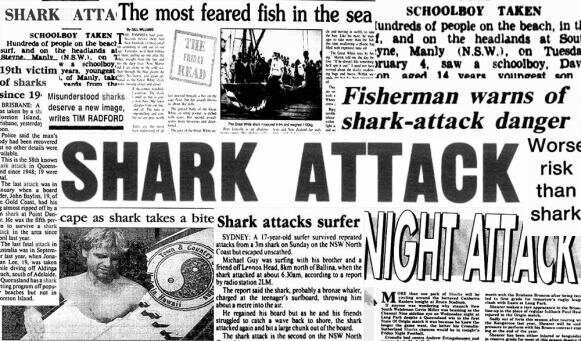JAWS AND EFFECT: DO SHARK FILMS GIVE THE SPECIES A BAD NAME?
Researchers from the University of Australia have found that 96% of all shark films portray sharks as a threat to humans.
They looked at 109 films released before January 2020, which meant that included some of the usual shark attack suspects, such as Jaws, The Reef, Deep Blue Sea, The Shallows and The Meg.
Conservation psychology researcher Brianna Le Busque, is the co-publisher of the study, entitled: Sharks on film: an analysis of how shark-human interactions are portrayed in films.
She said: "Since Jaws, we’ve seen a proliferation of monster shark movies — ‘Open Water,’ ‘The Meg,’ ’47 Meters Down,’ ‘Sharknado’ — all of which overtly present sharks as terrifying creatures with an insatiable appetite for human flesh... This is just not true."
Dr Brianna De Busque (top) is a Jaws fan and explains how she used to have a photo (bottom) of Steven Spielberg in Bruce the shark’s mouth on her wall as a child.
For me, that's the point. They aren't true, they are heightened works of fiction, we just enjoy seeing shark films and we know they are fins - not flights - of fancy. They are fun monster movies.
Ross caught up with Brianna to discuss the fascinating report, including the Jaws effect, which looks at how shark films may be giving the species a bad name, in both their content and in their posters.
Okay, so Open Water and The Reef take their cue from real life events and arguably Jaws doffs its Quint's cap to the Jersey Shore shark attacks of 1916 and gives us the very real sinking of the USS Indianapolis. The most haunting scene in the film, where it is just one man delivering a monologue.
But, Jaws, long pitched as the scourge of shark films - for turning man against shark - is, for many, the gateway for discovering more about the mesmerising fish.
It may have emptied beaches in 1975, or encouraged some to hunt the majestic great white, but more sharks have died at the hands of finning or pollution than from reading or watching Jaws.
Still, Peter Benchley spent the rest of his life recanting for unleashing the razor sharp teeth of the great white upon the public's imagination. Even going as far to say that he couldn't write Jaws today: Peter Benchley: From Jaws Author To Shark Saviour
Fact is, sharks were already scaring the public, with many a shark helping out various James Bond villain and sharks gaining increased noteriety from both the previously mentioned Jersey Shore shark attacks, and the spectre of shark attacks during World War 2: HOW WE CAME TO FEAR SHARKS... LONG BEFORE 'JAWS'
For many, Jaws is actually the launch pad for a lifetime of learning and loving all things shark, which means their survival, their conservation, everything about them. It's created far more Matt Hoopers than Quints: From Jaws Fan to Shark Biologist
Le Busque asserts that such films have been: "Exacerbating a fear of sharks that’s disproportionate to their actual threat damages conservation efforts, often influencing people to support potentially harmful mitigation strategies."
No one is going to see campy B-movies like Sharknado or Santa Jaws and feel threatened by sharks. Also, The Meg is a fun monster movie, that owes more to Godzilla or King Kong than say Jaws: Mega Low Down: The Meg Review
And yes, sharks in shark thriller and horror films attack people, but that's what we want to see, but purely as entertainment. That doesn't make us want to see bad things happen to sharks in real life.
Film is a two hour condensed world where the spectacular, the unreal and unlikely happen but are excepted in filmdom. Film is film, and film is fiction, for me the real villain of the piece should be the way television news, print and documentaries present sharks: Media's Feeding Frenzy on Shark Attacks
Words by Dean Newman
If you would like to contribute a guest blog, please visit our ‘work with us’ page



